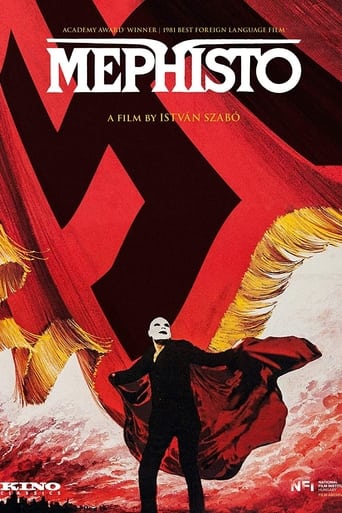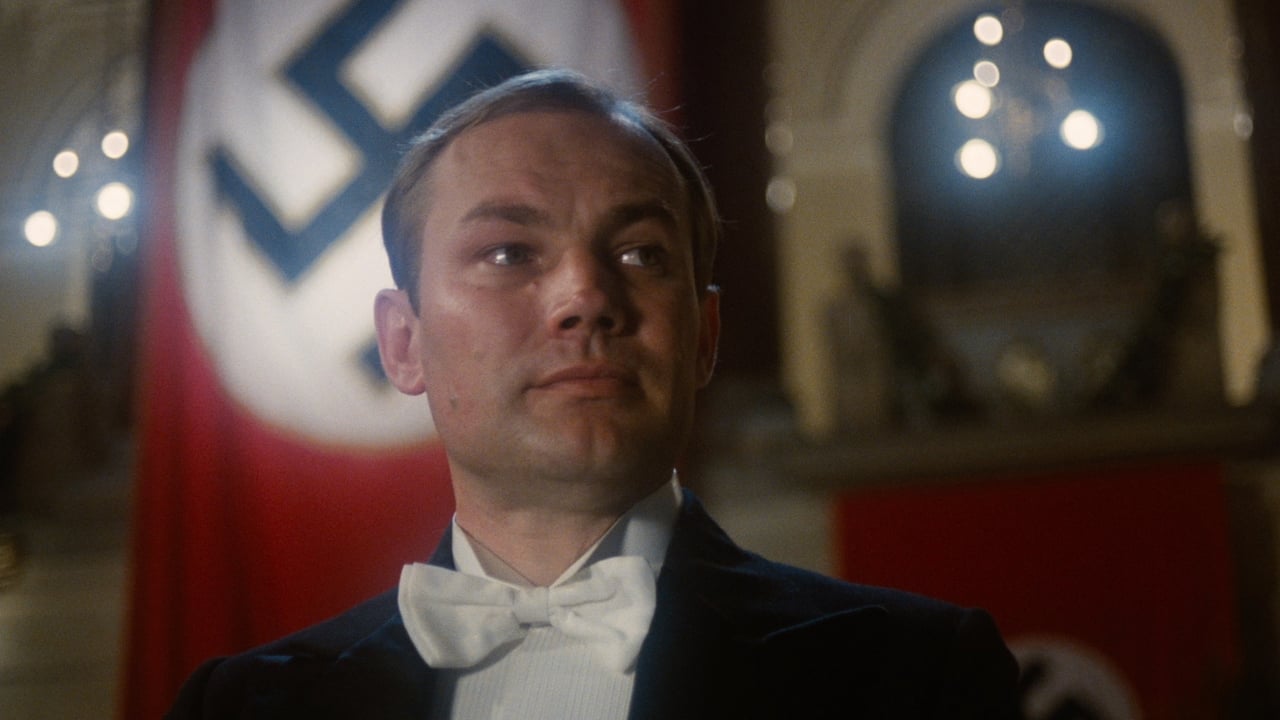Vonia
Mephisto (1981) Profound performance,
Faustian deal with Nazis.
But which one is Faust?
A fierce character study:
Which is real, mask or no mask? Intellectual
But little character growth,
Lacking depth and heart.
Academically great,
Yet not the most watchable. (Somonka is a Japanese form of poetry that is essentially two tanka poems, the second stanza a response to the first. Each stanza follows a 5-7-5-7-7 syllable pattern. Traditionally, each is a love letter. This form usually demands two authors, but it is possible to have a poet take on two personas. My somonka will be a love/hate letter to a film?) #Somonka #PoemReview
Boris European
Even after seeing Szabo's "Mephisto" a couple of times, it is still difficult to see through the actor Hoefgen, played brilliantly by one of the best actors, Klaus Maria Brandauer. Accompanying his rise to prominence, the viewers come to face important questions about morality, friendship, leadership, fame...At the beginning, Hoefgen dislikes the upcoming and dangerous Nazi clique. Yet, when he realizes that they are willing to give him the chance to become famous and respected, signs of hesitation can be hardly found - he grasps the opportunity to be in Berlin and be a director of the National Theatre. "I'am not interested in money", he says, however, he has already sold his soul to the devil (the Nazi party). Hoefgen has become the victim of his acclaimed theater character, Mephisto. Mephisto of the real world offered him to "win the crown of mankind" as Hoefgen did in his theater role, and the latter willingly accepted it. He closed his eyes to the beatings of the Jews he witnessed, the expelling of his lover, the escape of his wife, the banning from theater of his friends, etc.And yet, has he become the reincarnation of evil, the real Mephisto? I am inclined to think that Hoefgen had good intentions about his closest who opposed the system. This is shown by the fact that he insisted in front of the Nazi officials for his black lover to leave Nazi Germany safely and that his friend, Ulrichs, be rehabilitated. And he did it successfully. At that point comes the question whether Hoefgen made the right choice - should he have gone to the opposition and thus failed to save anyone, or he did the right thing by accepting Mephisto's offer and becoming a man of certain influence which he used to save his closest? Then again, do you close your eyes to the brutality around you as long as you and your friends are safe? A very interesting comparison can be made between the actor Miklas, played by the Hungarian Cserhalmi and also seen in the Czech Oscar-nominated production "Zelary" and other legendary films by the Hungarian directors Bela Tarr and Miklos Jancso, and Hoefgen. The former is an ardent supporter of the Nazis at the beginning but later becomes disillusioned and chooses the opposition. Hoefgen, on the other hand, moves in the opposite way in the movie. From an opponent of the Nazi "Mörderpakt" ("murderous thugs") as he calls them at the beginning, he becomes a follower (albeit no participant) and goes as far as to betray Miklas and his plan to the Nazi officials, resulting into Miklas' death. At the moment when Hoefgen learns about his death, he refuses to believe he was murdered but instead insists it was a car accident. In the close up of Brandauer's face talking to the woman, I believe the viewer can read regret in his eyes...Through both characters, and mainly through Hoefgen, Szabo raises the topic of the role of the intelligentsia in the Nazi rise to power. What were they supposed to do? The ones in the opposition either died or went into exile (as Hoefgen's wife). The rest followed the Nazis, willingly or not. In that age of hopelessness, should one sell his soul to Mephisto as Hoefgen did - then rise to power and save whomever you can? Overall, are we from our position nowadays able to judge how the intelligentsia/the actors should have acted? "Mephisto" has to be seen in the light of Szabo's life. It was recently revealed he was an informant for the Hungarian government in the 50's. In an interview he claimed to have saved himself and a friend of his from "being gibbeted". Resemblance to Hoefgen...? The towering performance of Brandauer as Hoefgen is absolutely stunning. His face, stature, looks, eyes, everything fits perfectly into the image of the divided personality of the main character (indicative of this personality is the Nazi general's inquiring why Hoefgen has such a soft handshake). Regarding the images, there is hardly a viewer who can forget Mephisto's white face on Brandauer and the shots of Hoefgen's moments of madness, estimation, megalomania, anger...Especially powerful is the last scene where Hoefgen is running and trying to hide from the giant searchlights of Olympiastadion in Berlin, his curved, almost crying face, and saying, "Was wollt ihr von mir? Ich bin nur ein Schauspieler.", "What do you want from me? I'm just an actor........"
debonville
This film faithfully recreates the novel written in 1936 by Klaus Mann. It is a reflection of the age old temptation of Man, the story of Goethe's Faust. Karl Maria Brandauer is magnificent as Hendrik Höfgen, the obsessed "actor" who will do anything to gain wealth and fame. He first betrays the world around him, and then his inner values are swept away as he finally enters the inner sanctum of Nazi Germany. Is true theatre on stage or in the handshake that Höfgen makes in the prime minister's box behind the audience? Everything in this movie revolves around Höfgen's downward spiral into the abyss; the initial ascent to stardom was but an illusion. Mann instinctively knew that tragedy would befall his country when a pact was made between Hitler and the financial, industrial and military élites of Germany - remember the book was written nine years before that country's downfall. View the movie and read the book. Two truly artistic achievements! Thumbs up to István Szabó and K.M. Brandauer who managed to reveal everything in Höfgen's character.
pderkx
If I would have to choose the best movie ever (a ridiculous question) I would opt for this one. It is entertaining and beautifully made, but it also gives you a lot to think. The film shows how a series of rather small understandable compromises, none of them very terrible in itself, can slowly lead to erosion of character and morality and in the end to terrible things, like siding with the Nazis and betraying your lover.



 AD
AD




